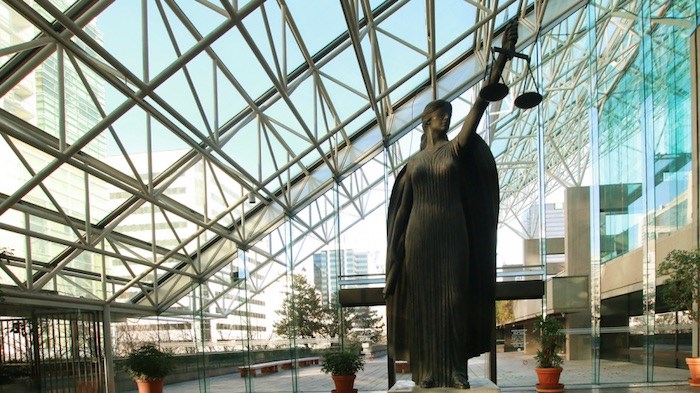 Photo: B.C. Supreme Court/Rob Kruyt
Photo: B.C. Supreme Court/Rob Kruyt
A guilty plea from a man convicted of assaulting his grandmother will stand despite his subsequent appeal claiming the plea was forced, B.C. Supreme Court says.
“Although he had a potential defence, he was aware of it, consulted counsel and chose to plead guilty,” Justice Nitya Iyer ruled in an Oct. 10 decision released Nov. 13.
Christopher Fabio Lopez was charged with assaulting his grandmother, Maria Torres, Dec. 22, 2017. He was also charged with two counts of breaching an undertaking to stay away from Torres' residence.
Lopez was late for the trial start and ordered detained. He was charged with failing to attend court as required and spent the night at the Surrey Pretrial Services Centre and brought to court the next morning.
Lopez rejected the provincial court judge’s suggestion he obtain a legal aid lawyer, choosing to represent himself.
Testifying for the prosecution, Torres said Lopez was living at her home. On the night in question, she heard a lot of noise in the kitchen.
There, the court ruling said, Lopez pushed her to the floor and put his hand on her face. After that, Mr. Lopez left and Ms. Torres called the police. She suffered pain and bruising and there was damage to the kitchen wall.”
Representing himself, Lopez cross-examined his grandmother, an exchange the court called acrimonious.
“Ms. Torres would either not give him the answer he wanted, and they would start arguing, or she would not answer the question,” Iyer wrote. “They would talk over each other, with Mr. Lopez sometimes reverting to Spanish, making the interpreter's job almost impossible.”
The trial judge had to intervene or assist Lopez frequently.
After a break during which Lopez spoke with a lawyer, a guilty plea to assault and breaching a court undertaking was explained and accepted by the court.
He was sentenced and immediately appealed.
He claimed he was unwell at Surrey Pretrial and during the trial. He said being at pretrial would conflict with a medical appointment for his ADHD condition.
He further claimed he was extremely unwell during the trial and broke down and collapsed on the floor towards the end of the day. He also said he has epilepsy and seizures.
“There is no evidence from Surrey Pretrial that Mr. Lopez was ill there,” Iyer wrote. “The record of proceedings contains no indication at all that Mr. Lopez broke down or collapsed on the floor during the trial.”
A psychiatric report did not mention epilepsy or seizures but did suggest an addiction issue.
“I am satisfied that Mr. Lopez made a conscious and deliberate choice to change his plea,” Iyer said. “He was not forced to plead guilty.”
“A guilty plea in open court is presumed to be voluntary, and its voluntariness is not negated by stress, anxiety, fear of incarceration or a desire to get out of jail,” Iyer said.


